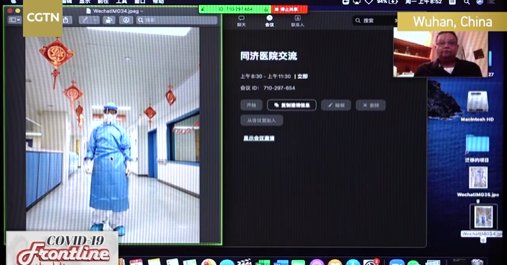
Editor's Note: The World Health Organization (WHO) declared COVID-19 a pandemic on March 12. As of April 6, about 200 countries and regions have confirmed over 1,100,000 cases, with more than 60,000 deaths, according to the WHO. CGTN's live program "COVID-19 Frontline" invites medical workers and experts from central China's Wuhan and all over the world to share their experiences and take questions from social media users, in the hope of providing more information to those who are battling against the pandemic.
In the latest episode of CGTN's live program "COVID-19 Frontline," Chinese doctors who have been treating patients in the country's once hardest-hit city of Wuhan since the outbreak of the virus in January, shared first-hand experience with their Canadian counterparts.
Monday's program brought together two experts of anesthesiology and pediatric surgery from Tongji Hospital of Huazhong University of Science and Technology, one of China's top hospitals, and Canadian medics from Ontario's London Health Science Center (LHSC), one of Canada's largest acute-care teaching hospitals.
Live: Chinese frontline doctors share COVID-19 experience with Canadian medics
As of Sunday, Canada has reported more than 14,000 confirmed cases of COVID-19, with over 200 deaths, according to the data from Johns Hopkins University
During the program, Raju Poolacherla and Mohamada Ahmed, two doctors from the Department of Anesthesia and Perioperative Medicine of LHSC, asked questions about basic issues like what kind of personal protective equipment (PPE) should be used for technical problems such as carrying out intubation for COVID-19 patients while avoiding getting infected.

Chinese doctors from Tongji Hospital of Huazhong University of Science and Technology share experience on COVID-19 treatment with Canadian medics from London Health Science Center in Ontario during a live stream program on April 6. /CGTN screenshot
Chinese doctors have repeatedly stressed that PPE is crucial to protect frontline medical workers, fighting COVID-19, from getting infected, and Level-3 PPE is highly recommended to medical staff handling suspected and confirmed patients, including those with no symptoms.
They showed their Canadian counterparts a picture of a medical staff member wearing Level-3 PPE, which includes protective gown, N95 mask, goggle, face shield, gloves, and foot covers, that can shield the whole body against the virus.

Chinese doctors from Tongji Hospital of Huazhong University of Science and Technology show a picture of a medical staff member wearing Level-3 PPE in their hospital during a live stream program on April 6. /CGTN screenshot
For physicians who need to conduct surgeries, additional surgical gowns and gloves, use anti-bacteria agents on their arms and hands to ensure safety are required, said Yang Jixin, a physician at the Department of Pediatric Surgery, Tongji Hospital.
He suggested that selected operations should be postponed after the pandemic. For urgent operations which have to be done immediately, medial workers should be provided with Level-3 PPE, and the duration of the operations should be controlled within a short period of time to reduce the risk of cross infections.
The Canadian doctors said they were impressed by the low-infection rate among medical staff in China, as there is a high proportion of infected medical workers in Italy and the U.S. "You've done a remarkable job in preventing your colleagues from getting infected," said Mohamada.
They also asked how to keep up the morale of the medical workers.
Zheng Hua, a doctor at the Department Anesthesiology, Tongji Hospital, said that systematic training to the medial staff, including the knowledge of the virus and how to effectively protect themselves from getting infected, plays a vital role.
While explaining how a hospital should be managed during the crisis, the Chinese doctors revealed that their hospital has been divided into three separated zones: clean zone, semi-contaminated zone, and contaminated zone, adding that the channel used to transfer COVID-19 patients from one zone to another is separate from the one used by medical staff.
In previous programs over the past weeks, Chinese health experts have shared their experience with medics from the U.S., UK, Israel, Australia, Iran, and South Africa, with regard to a wide range of topics, such as how to protect medical workers, the effects of Traditional Chinese Medicine (TCM), and the impact of different antivirals.
In the later programs, more doctors and experts on the frontline in Wuhan will join in to share their experience with their peers from the world. And for those who have questions or confusions, you can also pose your questions with CGTN using #MyOpinionOnCOVID19 on Facebook.